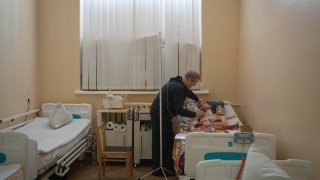
In a Ukrainian hospital ward for wounded soldiers, where daylight barely penetrates, a father talks to his injured son for hours. Serhii Shumei, 64, never scolded Vitalii for choosing to go to war. Even now, despite the damage done to his son's brain by an exploding artillery shell, Serhii feels pride, not pity.
“I’ve been constantly with him in the last five months, beside him, beside him, beside him," says Serhii, a retired former soldier himself. "I’m not going anywhere. … except for a smoke.”
Vitalii, a 34-year-old long-range anti-aircraft missile commander, was wounded in the Donbas region of eastern Ukraine that has become synonymous with horrific losses in ongoing fighting for both Ukraine and Russia. Quite how deadly isn't known — because neither side is saying. From the stream of wounded soldiers that are coming off frontlines to hospitals like the one where Vitalii lies, it's evident the costs are severe.
Both sides have poured troops and resources to capture or defend Donbas strongholds, fighting over months of grinding, attritional combat to what has largely become a bloody stalemate. After setbacks elsewhere in Ukraine for President Vladimir Putin's nearly 11-month invasion, Russia is looking for some sort of localized success in the Donbas, even if that just means taking control of a town or two pounded into rubble. Ukraine wants to make Russia's advances as costly as possible.
Get top local stories in Philly delivered to you every morning. >Sign up for NBC Philadelphia's News Headlines newsletter.
The Donbas towns of Bakhmut and Soledar have been turned into hellscapes as a result. Ukrainian President Volodymyr Zelenskyy described them as “completely destroyed,” strewn with corpses and craters, and with “almost no life left.”
“This is what madness looks like," Zelenskyy says.
Vitalii was wounded Aug. 25 on another section of the Donbas frontline, in Adviivka, about 70 kilometers (45 miles) south of Bakhmut. The shell that struck his dugout set off other explosives. The blast tore a crater in Vitalii's skull that is as deep and broad as half a melon. His brain injuries were so severe that doctors doubted he'd show signs of consciousness again.
U.S. & World
Stories that affect your life across the U.S. and around the world.
Now, Vitalii sometimes seems aware of his surroundings. He blinks. He can swallow. But he’s largely immobile.
Serhii refuses to give up on him.
“We are seeing some progress, getting back on our feet. This is my opinion," he says.
He spends hours at Vitalii's bedside, sharing news from the battlefields, reciting from books, and reading out messages of support.
They're sent by grateful Ukrainians who urge Vitalii to “Hold on to life! We really need you!” and say “You are strong! You will manage!”
Serhii says tears roll down Vitalii’s cheeks when he reads them to him. Other signs of improvement appeared in late December, when Vitalii started wiggling his toes, Serhii says. Vitalii also has started to frown, which Serhii interprets as meaning that his son is interested in what he's reading to him.
And recently, Serhii says, another breakthrough: audible responses from Vitalii.
“I’ve started asking him ‘Do you know who I am?’ And he answered ‘Dad’.”
Another of Vitalii's frequent visitors is Iryna Timofeyeva, a volunteer whose brainchild it was to collect messages of support.
"The love of the family, the attention of other people, very often helps the positive dynamics of the patient,” she says. “It is very important for the wounded that he is not alone. That is how he understands that he has to fight.”
Vitalii is, for now, alone in his ward, after other patients were transferred for rehabilitation elsewhere. But the beds around him are unlikely to stay empty for long, given the ferocity of the fighting in the Donbas. Vitalii's hospital in Chernihiv, north of Ukraine's capital, Kyiv, is among those where soldiers get long-term follow-up care after their wounds have been stabilized closer to the fronts.
Serhii feels that caring for his son is his contribution to the war effort.
“I will put him back on his feet. This is my dream,” he says.
Inclining to his son’s ear, he asks: “Ukraine will win, we will win, right?”
The answer is silence.
___
Efrem Lukatsky in Chernihiv and John Leicester in Paris contributed to this report.
___
Follow AP’s coverage of the war at https://apnews.com/hub/russia-ukraine



